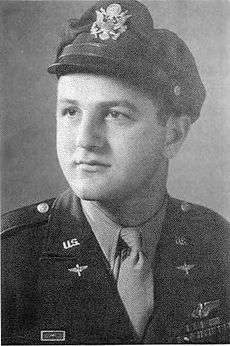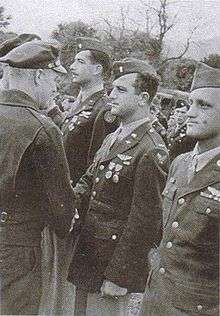Carl Genian
Carl Genian (September 21, 1921 – May 25, 1967) was a first lieutenant in the United States Army Air Forces during World War II. During the war, Genian spent eleven months overseas and flew 66 combat missions pursuing numerous bombing targets that spanned eight countries from France to the Balkans. He and his unit received many commendations for close support, pinpoint bombing operations and heroism. Genian's medals include the Distinguished Flying Cross, Soldiers Medal and an Air Medal with six oak leaf clusters.[1]
Carl Genian | |
|---|---|
 | |
| Born | September 21, 1921 |
| Died | May 10, 1967 (aged 45) |
| Allegiance | United States |
| Service/ | United States Army Air Forces |
| Years of service | March 1943 – July 1945 |
| Rank | First Lieutenant |
| Service number | 19062995 |
| Battles/wars | World War II:
|
| Awards | Distinguished Flying Cross Soldier's Medal Air Medal (7) |
| Spouse(s) | Lucy Jandegian |
| Other work | Estimator for Gordon Ball Construction Company |
Life
Of Armenian descent, Genian was born in Yettem, California and was the oldest of four children.[2] His father, Arshag Genian, was born in Tomarza, Ottoman Empire and moved to the United States and became a rancher in Dinuba, California.[2] His mother, Eliza (Mendikian) Genian, was born in Kayseri, Ottoman Empire.[2] Carl Genian had two sisters, Charlotte and Stella, and the youngest of the four children was his brother Sam.[2]
Genian attended Dinuba High School, where he participated in basketball and played sousaphone and tuba in the band.[3] After school, when time permitted, Genian joined the family to work on the farm. After graduation, he enlisted as an aviation cadet. He subsequently attended the Army Air Force school for radio operations and mechanics at Scott Field, Illinois, and the school for bombardiers in San Angelo, Texas.[4]
After his discharge from the Air Force in July 1945, he attended UC Berkeley and majored in civil engineering.[5] He graduated from UC Berkeley in 1950.[6] In 1946, before completing his studies, he went to work for Gordon Ball Construction Company in Danville, California. He became an estimator for building bridges and highways until his death on May 25, 1967.[5]
Genian was married to Lucy Jandegian, born in South Milwaukee, Wisconsin.[5] They had two children: Bill born in 1950, and Christopher, born in 1962.[5]
World War II

Genian received his commission as a second lieutenant[7] in December 1943 and was posted overseas in April 1944.[4]
He was assigned as an aerial bombardier in the 340th Bombardment Group (M), a B-25 Mitchell medium bomber group, in the Twelfth Air Force in the Mediterranean theater.[4]
Genian's unit attacked German beachhead defenses while Allied assault troops opened the front in southern France, and then moved northward to destroy German communications.[4]
—Genian's letter to his mother dated November 14, 1944 written before his 48th mission[5]
His unit then helped to push German forces out of Tunisia, Sicily and central Italy. The 340th was awarded the Presidential Unit Citation as a distinguished unit, both for outstanding support of the British Eighth Army and the United States Seventh Army in Sicily and for compiling a record of 100 percent target hits in a full month of operation.[4]
Genian was awarded one of his six oak leaf clusters early in the spring of 1944.[4]
In June 1944, Genian's unit helped break the stalemate on the Adolf Hitler Line below Rome. Their attacks on viaducts and on rail and road bridges were part of the "bridge-busting" missions that cut off German supply lines and enabled Allied ground forces to push the Germans back above Rome.[4]
He was awarded the Air Medal for meritorious service on June 22, 1944.[4]
A month later, Genian was awarded the Soldier's Medal for heroism when, after discovering that three 100-pound bombs had failed to release, he lowered himself into his plane's bomb bay and, while being held in a precarious position, loosened and jettisoned the bombs.[8]
—Genian's sister, Stella Michaelian[5]
That same month, during one of Genian's bombing runs over Germany, his plane was hit by German ground fire. Genian's plane had one of its two engines knocked out and was forced to make an emergency landing at an airstrip under Russian control. Russian soldiers rushed out, picked up the American airmen and took them to an Army camp. Genian was put in a cabin until the Russians contacted the U.S. Air Force Headquarters to notify them of the crew's internment. During his internment, Genian had the opportunity to meet with Soviet Armenian General Marshal Baghramyan.[8] At that time, Baghramyan had become the commander of the 1st Baltic Front (later known as the Samland group). After the war, he was appointed Commander of the Baltic Military District. After Baghramyan and Genian had a conversation in Armenian, the general ordered his aide to inform the camp commander that every camp courtesy be given to the American airmen.[8]
On October 12, 1944, Genian guided his pilot to the successful completion of a mission over Bologna, Italy, despite the fact that the plane was heavily damaged from German anti-aircraft fire. For these actions, he was awarded the Distinguished Flying Cross.[5][1]
Military decorations
Genian's military decorations include:[2]
| Distinguished Flying Cross | |
| Soldier's Medal | |
| Air Medal with one silver and one bronze oak leaf cluster (seven awards) | |
| European-African-Middle Eastern Campaign Medal with one silver and one bronze campaign star (six campaigns) | |
| World War II Victory Medal | |
| Presidential Unit Citation with one bronze oak leaf cluster (two awards) |
See also
References
- Notes
- Armenian General Benevolent Union 1951, p. 103.
- Demirjian 1996, p. 296.
- Demirjian 1996, p. 296-97.
- Demirjian 1996, p. 297.
- Demirjian 1996, p. 302.
- Blue and Gold: Being a Record of the College Year. University of California, Berkeley. 1950.
- "July 1944" (PDF). 57th Bomb Wing Association Website.
- Demirjian 1996, p. 299.
- Bibliography
- Armenian General Benevolent Union (1951). Armenian-American veterans of World War II. "Our Boys" Committee.CS1 maint: ref=harv (link)
- Demirjian, Richard N. (1996). Triumph and glory : Armenian World War II heroes. Moraga, Calif.: Ararat Heritage Publ. ISBN 9780962294518.CS1 maint: ref=harv (link)